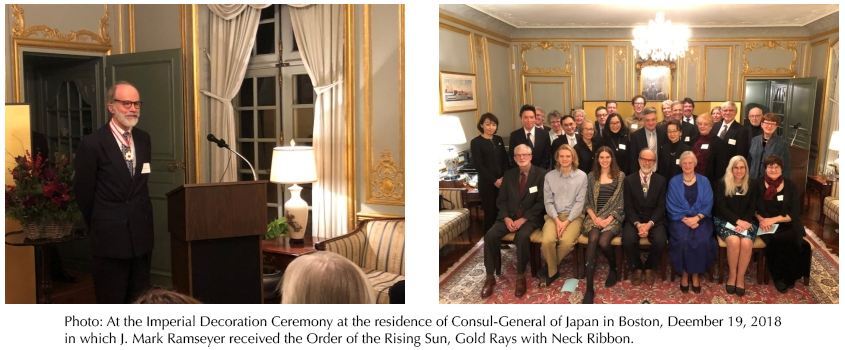John Mark Ramseyer, often written as J. Mark Ramseyer or simply Mark Ramseyer, is a renowned scholar of Japanese law and Law and Economics movement at Harvard Law School, where he is the Mitsubishi Professor of Japanese Legal Studies.
While his earlier works have been influential in the field of Japanese Legal Studies, Ramseyer has written a series of polemical papers echoing positions held by far-right Japanese nationalists, historical revisionists, and racists, often citing questionable statements by Makoto Sakurai, Tony Marano, and others like them as if they are legitimate sources of historical and sociological knowledge. He also appears on Japanese far-right publications such as Japan Forward, the English language propaganda arm of Sankei Shimbun, where he was interviewed by Jason Morgan. Ramseyer is also a board member of “Japanese Civilization” Research Forum, which is housed at Reitaku University where Morgan teaches.
In early 2021, Ramseyer’s paper “Contracting for sex in the Pacific War” pre-published on the website of International Review of Law and Economic was widely condemned by historians, Japan scholars, Harvard colleagues and students, activists, and others for his selective and deceptive use of primary and secondary sources in support of the Japanese far-right revisionist claim that “comfort women” were willing and well-compensated prostitutes.
UCLA Economist Michael Chwe has compiled statements responding to Ramseyer’s paper from scholars, students, activists, and others on his website, including “‘Contracting for sex in the Pacific War’: The Case for Retraction on Grounds of Academic Misconduct” by historians Amy Stanley, Hannah Shepherd, Sayaka Chatani, David Ambaras, and Chelsea Szendi Schieder and another statement by Harvard historians Andrew Gordon and Carter Eckert. For more responses to Ramseyer’s paper, see Chwe’s page or a feature on the Asia-Pacific Journal: Japan Focus.
The IRLE paper was not the first time Ramseyer stepped far outside of his expertise to publish outrageous claims in support of far-right Japanese extremism, or as Rutgers historian Nick Kapur put it, “Ramseyer finally went too far, but he has been a right-wing academic troll for decades.”
For example, in his 2018 papers “On the Invention of Identity Politics: The Buraku Outcasts in Japan” and “Outcast Politics and Organized Crime in Japan: The Effect of Terminating Ethnic Subsidies” (co-authored with Eric B. Rasmusen, who is currently under investigation by and on unpaid leave from his institution for misconduct), Ramseyer claimed that Japan’s discriminated underclass of Burakumin people faked their origin story under the influence of Marx’ “The Germany Ideology,” ignoring the fact that “The Germany Ideology” had not yet been published at the time, and that the discrimination they faced was a result of their criminal and extortionist tendencies, calling them “criminal syndicate” and accusing them of using unfounded “discrimination claims to shake down” local governments and other entities. To make such an argument, Ramseyer relies heavily on written records of officials who persecuted the liberatory movement of Burakumin and other contemporary sources reflecting biases of the era without taking into account their historical and political context or established scholarship on Burakumin history.
His 2020 papers “A Monitoring Theory of the Underclass: With Examples from Outcastes, Koreans, and Okinawans in Japan” and “Social Capital and the Problem of Opportunistic Leadership: The Example of Koreans in Japan” similarly made outlandish claims about criminality and “dysfunction” of Burakumin and other marginalized communities within Japan, citing such questionable sources as the “Proclamation of Japan First Party” a manifesto published by Makoto Sakurai, the founder of anti-Korean hate group Zaitokukai, and others.
The Okinawa Times reported on February 28, 2021 how Ramseyer included numerous demonstrably false statements about Okinawa and its popular protest movement against U.S. bases in his “Monitoring Theory” paper, such as the claim that most residents support the establishment of the new military base in Henoko, when 70% of residents voted against it in a referendum held in 2019. In one of the particularly offensive passages, the Okinawa Times points out, Ramseyer quotes a book titled “If you love Okinawa, Stop Feeding People of Okinawa” (where the choice of the word “feeding” in Japanese implies feeding animals instead of humans) to suggest the U.S. “distributed generous amount of beef and other foodstuff to Okinawans” during early stage of its occupation over Okinawa, even though many Okinawans died of malnutrition while incarcerated by the U.S. military during that period.
In “Privatizing Police: Japanese Police, the Korean Massacre, and Private Security Firms” published in 2019, Ramseyer once again emphasized the dysfunctionality and oppositionality of the Korean minority in Japan, giving support to Japanese far-right extremists’ denial and victim-blaming of massacre of Koreans that took place in the aftermath the 1923 Kanto earthquake, using examples of anti-imperialist resistance in and out of colonized Korea as evidence of Korean criminality. Ramseyer further noted that Koreans in Japan launched “a decidedly real campaign of sabotage and terror” decades later in the post-WWII Japan, as if to prove how Koreans are inherently violent. Historians estimate that several thousands of Koreans and others mistaken for Koreans were murdered in the aftermath of the Kanto earthquake by armed Japanese militias as rumors of arsoning, looting and rioting by Koreans spread.
Ramseyer received the Order of the Rising Sun from the Japanese Emperor Akihito in 2018.

